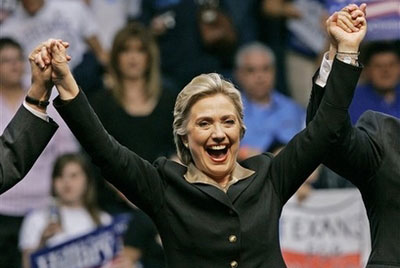Clinton faces daunting delegate deficit
Updated: 2008-02-21 13:36
 |
|
Democratic presidential hopeful, Sen. Hillary Rodham Clinton, D-N.Y., reacts during a campaign stop at the Dodge Arena in Hildago, Texas, Wednesday, Feb. 20, 2008. [Agencies] |
WASHINGTON - Democratic Sen. Hillary Rodham Clinton must win 57 percent of the remaining primary and caucus delegates to erase Barack Obama's lead, a daunting task requiring landslide-sized victories by a struggling presidential candidate.
Obama's victories in Wisconsin and Hawaii on Tuesday -- his ninth and 10th in a row -- left him with 1,178 pledged delegates won in primaries and caucuses in The Associated Press' count. Clinton has 1,024.
Further complicating Clinton's challenge, Obama appears particularly well-positioned to win at least one of the remaining states with ease. Mississippi, with a primary on March 11, fits a pattern of Southern states with large black populations that he has won handily, including South Carolina, Alabama, Georgia and Louisiana.
The rival campaigns maintain their own delegate counts. And while both agree Obama is the leader, they differ on the significance.
"The only way in this system to amass delegates is to win by big margins. Close races result in close delegate distribution," David Plouffe, Obama's campaign manager, told reporters in a conference call.
"The only way she can do it is winning states like Ohio 65-35, Texas 65-35, Pennsylvania, you know, 70-30. and you go on and on and on. She'd have to win pretty much all the states, even states where we're considered to have some strength," he added.
Clinton's top aides said Plouffe was deliberately trying to set unrealistically high expectations for the former first lady.
"We expect to do well in both those states," said Harold Ickes, speaking of Texas and Ohio, which hold primaries on March 4. "But 65 percent is a far reach and there is no expectation here that we're going to hit that number."
"We're in the neighborhood of about 75 delegates behind, that is less that 3 percent of the total number of delegates who have been elected. We expect to narrow that gap substantially by the end of this process," he added.
Obama's lead in delegates won at the ballot box is partially offset by Clinton's advantage among superdelegates -- members of Congress, governors and other party leaders who are unpledged to either candidate. She leads in that category, 238-173, cutting Obama's overall margin to 89 delegates in the AP count.
Superdelegates are free to shift allegiances. And Clinton's recent string of primary and caucuses defeats coincides with a slow erosion of support among the same party leaders who established her as the front-runner months before the first votes were cast.
She has failed to add any since Super Tuesday on Feb. 5, while Obama is slowly gaining ground.
|
|
|
||
|
||
|
|
|
|







